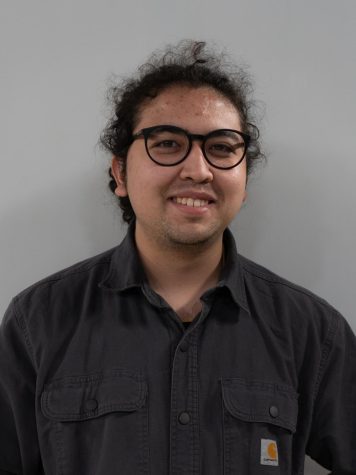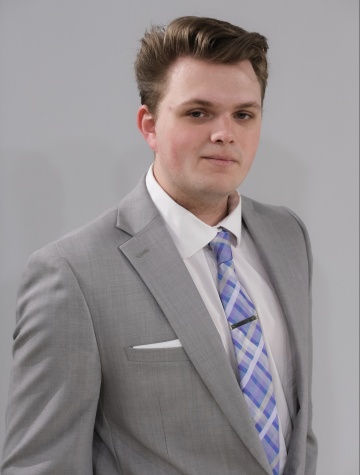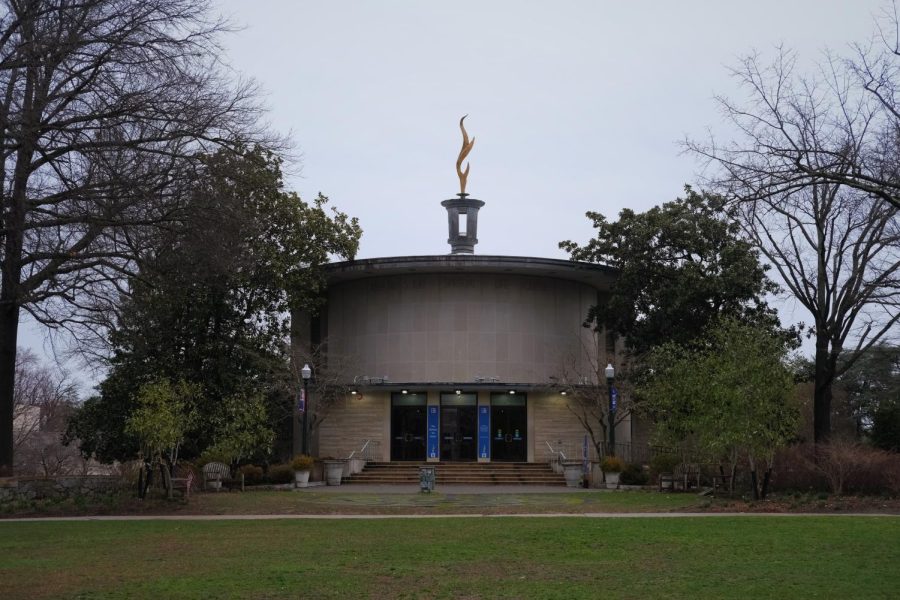The lasting impact of antisemitism on campus
Students express emotions on antisemitic incidents on campus
Students received another email from President Sylvia Burwell at the start of the spring semester addressing the rise of antisemitism and how American University is working on critical areas to confront antisemitism on campus.
“Like you, we are troubled by the rise of hate and bias incidents in society, including the scourge of antisemitism,” Burwell said in the Jan. 25 email. “Our ongoing work is based on our deeply held values of respect and inclusive excellence. We have organized efforts in key areas including education and training, curriculum development, and partnerships and events.”
In the same email, Burwell also mentioned the September 2022 incident in Anderson Hall and said AUPD could not identify a responsible party for the antisemitic graphite found in the dormitory.
On the evening of Sept. 26, 2022, the student body received an email from President Sylvia Burwell that said an antisemitic symbol was found drawn on a ceiling tile in Anderson Hall.
“This afternoon, a swastika was reported in a ceiling tile of an Anderson Hall bathroom,” Burwell said. “Immediately, Housing and Residence Life staff and AUPD responded to the location, documented the scene and removed the ceiling tile.”
Students like first-year Ido Leidner said they are grappling with the news and how to react.
“I scoffed,” Leidner said in response to the university’s September 2022 email. “If you don’t talk about it and you don’t raise awareness, it’s going to happen again,” Leidner said.
In recent years, reports of antisemitic acts on college campuses have been rising steadily, according to an annual assessment of nationwide incidents of antisemitism conducted by the Anti-Defamation League. The assessment showed 2,717 antisemitic incidents reported in 2021, the highest number recorded since the ADL began its evaluations in 1979. The incidents consisted of 88 physical assaults, 853 instances of vandalism and 1,776 instances of harassment.
Antisemitism is defined as prejudice, hostility and forms of oppression aimed toward Jewish people due to their faith, according to the ADL. The term “antisemitism” was first popularized by German journalist Wilhelm Marr to describe hatred or hostility toward Jewish people, according to the Jewish Virtual Library.
Leidner said it is crucial for Jewish people to define antisemitism and that people who are not Jewish should not be able to determine what is and isn’t antisemitic.
At American University, an estimated 20% of undergraduate and 16% of graduate students are Jewish, according to Hillel International.
The university’s large Jewish population was, according to Leidner, one of the factors that drew him to the university—which is why he’s surprised that antisemitic incidents still happen on campus.
Antisemitic incidents on college campuses increased by 21% between 2020 and 2021, according to the ADL.
The antisemitic graffiti drawn in September 2022 was not AU’s first encounter with antisemitism on campus. In September 2021, antisemitic graffiti was found in Anderson Hall, and President Sylvia Burwell sent an email to students and faculty after the incident.
“[The university] wants to address the ongoing concerns and hurt in our community regarding antisemitism and the graffiti found in a lower-level bathroom of Anderson Hall. Antisemitism has no place in our community,” Burwell said in the email.
The increase in antisemitic incidents on college campuses, as seen in the past couple of years at AU, has not gone unnoticed by those on campus.
“We have seen a notable increase in the number of antisemitic incidents over the last couple of years,” said Jason Benkendorf, executive director of AU Hillel. “That’s been true at AU, and that’s been true at countless other university campuses and unfortunately countless other communities. That’s just, unfortunately, the moment in time that we’re living in.”
The 2021 and 2022 antisemitic incidents occurred during the Jewish High Holiday season, which begins with Rosh Hashanah, the Jewish New Year, commemorating the world’s creation. This marks the beginning of the Days of Awe, a 10-day period of introspection and repentance that culminates with Judaism’s holiest day of Yom Kippur, a day of fasting and atonement.
Freshman Julia Rothman said the September 2022 email caught her off guard since she wasn’t in D.C. when it was sent out. Rothman was at home celebrating Rosh Hashanah with her family. She said the email felt too simplistic to her, given the substantiality of the incident.
In the email, Burwell said she condemns antisemitism.
“The discovery of this hate symbol during Rosh Hashanah, a holy time for our Jewish community members, adds to the harm and hurt. Antisemitism in any form takes a terrible toll and is unacceptable,” Burwell said in the email. “We recognize that many of our Jewish community members may still be celebrating the holiday, but we wanted to make the community aware of the situation and share relevant safety and support resources as soon as possible.”
Rothman said she feels disregarded by the university after reading the email.
“I don’t feel seen. It feels like a lot of the time the school wants to save face and make themselves seem like they’re dealing with the issue when they’re not,” Rothman said.
Rothman also said the incident made her feel uncomfortable and ostracized within her community. She said it’s tiring to talk about antisemitism as one of the only Jewish students in her classes.
“I don’t always want to talk about antisemitism, it’s just not a super fun topic to talk about in your lab class being the only Jew there, and feeling pressured to speak about it and being asked questions by professors,” Rothman said.
Benkendorf said that he has seen how such incidents affect the students attending Hillel, whether directly or indirectly involved.
“Certainly those students who have been very directly impacted by incidents can feel that very acutely, and it can very much challenge their sense of safety and well-being, and that’s certainly painful for us to see students going through those sorts of experiences,” Benkendorf said. “And I think even for many Jewish students who may not have been directly impacted by incidents, many are still impacted. They still feel it.”
Leidner said the incident hit particularly close to home.
“I think the best way to describe it is feeling violated, especially because it happened one floor beneath me,” Leidner said. “That kind of broke the illusion of safety that you come with to AU.”
Leidner said that the uptick in antisemitic incidents has made him hypervigilant. He said he now feels unsafe publicly identifying as Jewish and has stopped wearing his Star of David necklace. Leidner said it’s now normal for Jewish students to avoid wearing shirts with Hebrew writing or Kippahs outside of religious services.
Rothman said she still feels safe practicing her religion on campus, but it makes her nervous knowing that antisemitic incidents have happened in the past.
Leidner said part of him wasn’t shocked to hear about the incident since antisemitism is widespread, and he feels these incidents will continue.
“You see it online all the time. It’s the oldest form of hate and it’s also one of the most normalized forms of hate,” Leidner said.
However, Leidner said that the frequency of antisemitic incidents should not be a reason to discount them.
Sophomore Lane Schnell said they still feel comfortable practicing Judaism on campus. However, they said they also feel disappointed by the university’s lack of action, considering the recurring incidents.
“It’s never something that makes me scared or uncomfortable to be Jewish on campus, it just makes me generally sort of angry or frustrated in a way that I can’t describe,” Schnell said.
Schnell said they wonder why the university hasn’t done more to address antisemitism on campus, considering it’s not new.
“It’s both a frustration with the concept of antisemitism but also a frustration with institutions and organizations that do not appear to be doing all that they can to combat this,” Schnell said.
In addition to support from the university, Benkendorf said that Jewish students need support from their peers — especially those who are not Jewish — in the wake of antisemitic incidents.
He also said educating students about the Jewish faith is the first step to dispelling hate and creating open-mindedness.
“Jewish identity is much broader than religion, and if folks don’t understand Jewish identity, it can be really difficult to recognize the different ways that antisemitism manifests,” Benkendorf said. “So partially we need to talk about antisemitism, but I think it’s also really important that we simply create space for folks to learn about Jewish identity and understand who Jews are.”
Leidner said when antisemitic incidents occur, he feels frustrated by the lack of attention the incidents receive and the university’s inaction.
“[It] completely goes under the radar of the administration, of students, of student organizations. It makes the Jewish community feel like ‘Hey, nobody besides us cares about it, so we’ve just got to suck it up,’” Leidner said.
Jasmine Pelaez, AU’s internal communications manager, said the university is committed to the safety and sense of belonging for Jewish community members at American University.
“AU strongly condemns any hateful, antisemitic acts. Antisemitism in any form takes a terrible toll and is unacceptable,” Pelaez said. “AU is currently conducting and planning a broad range of activities and action steps, including educational and training opportunities, curriculum development and campus-wide events designed to both educate and create community awareness on how to best combat antisemitism.”
Pelaez said the university recently hosted an event for faculty and staff across campus.
“[The event] focused on combating all forms of hate and extremism, including antisemitism, in the classroom, led by AU’s Polarization and Extremism Research and Innovation Lab (PERIL),” Pelaez said.
Additionally, after the incident in the fall of 2021, university leaders attended an education session on antisemitism with the ADL, Burwell said in an email.
Leidner said he wants American University to implement more substantial investigations. However, he said he understands that there are limited things that the university can do to prevent such incidents.
“The safety of your students is worth more than 24 hours of intense work,” Leidner said.
Colleges around the country, such as the University of California, Berkeley, have started to implement programs to combat antisemitism on campus, according to Berkley Law. In 2019, UC Berkeley implemented an Antisemitism Education Initiative.
According to Berkley Law, the initiative hosts workshops for groups of campus staff and students, brings major speakers to campus and has created an online module used as part of student orientation.
Pelaez said that AU is beginning to develop training on Jewish identity and antisemitism for its campus staff and student leaders.
“Working with Hillel, we’ve also reconvened a broad group of stakeholders to work on ways to best address this local and global problem. Additional events and training are also underway. AUPD safety services, including the Rave Guardian Safety app and campus escort services, are available,” Pelaez said.
Leidner said the next steps toward addressing antisemitism are simple: “Listen to Jewish people, advocate for Jewish people and stand with Jewish people and do your part.”

Leehy Gertner (she/her) is a junior majoring in psychology and neuroscience. She grew up in Boston and deeply misses the New England fall and Dunkin’...

Matheus Kogi Fugita Abrahão (he/him) is a sophomore studying journalism. He is a passionate photographer who also enjoys soccer.

Jack Ford (He/Him) is a senior studying journalism. He enjoys working out, photography, and the beach.









